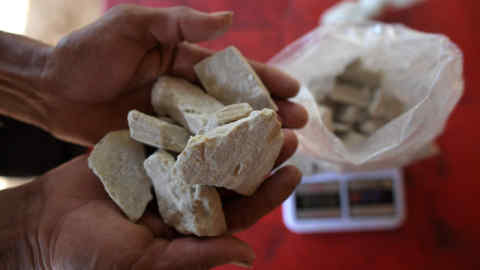Paraguay has long been a haven for smuggling anything from cigarettes to luxury goods. But US sanctions against two of its top politicians, alongside a surge in assassinations and narcotics-related violence, have sparked concern that organised criminal gangs have penetrated the top levels of power in one of Washington’s main regional allies.
With the South American nation preparing for presidential elections in April, Washington last month blacklisted vice-president Hugo Velázquez and former president Horacio Cartes for alleged corruption. Velázquez was expected to run as a ruling party candidate in the polls and Cartes retains significant influence over national politics and business. The sanctions mean the men, who have both denied the allegations, will be barred from the US.
The move reflects rising concern in Washington that Paraguay could be destabilised if its institutions and elites fall under the influence of organised crime, observers say.
By publicly naming the pair, who are members of the governing conservative Colorado Party, Washington is sending a message to the government that it needs to clean up public life ahead of the 2023 election, according to Eduardo Nakayama, a Paraguayan opposition politician.
“Paraguay is a major supplier of cocaine to Latin America and Europe . . . There are criminal gangs entering politics at a regional, municipal and judicial level,” he said.
A landlocked soy and beef exporting nation strategically located in the centre of South America, Paraguay has long been a staging post for both legitimate trade and smuggling. But this year it has suffered a surge in targeted assassinations and gang violence that has alarmed US law enforcement.
Paraguay’s vice-president Hugo Velázquez. The country’s attorney-general has opened a criminal investigation into the US allegations against him © Jorge Saenz/AP
Marcelo Pecci, a lead prosecutor in a high-profile investigation into cocaine trafficking and money laundering earlier this year, was shot dead by hitmen in May while honeymooning in Colombia.
A week later, José Carlos Acevedo, long-serving mayor of the city of Pedro Juan Caballero, was killed outside a municipal building, months after his niece Belén Acevedo was assassinated. Local media attributed both killings to drug gangs.
Some of the biggest hauls of cocaine confiscated in Europe since 2019 have been traced back to Paraguayan river ports. A record 16 tonnes worth up to $4.2bn seized in Hamburg last year was exported from Villeta, near the capital Asunción.
Jimena Blanco, head of Americas research at Verisk Maplecroft, a UK risk consultancy, said there had been “an expansion of gang operations from Brazil” to traffic cocaine through Paraguay as cartels extend their markets.
Asked about the situation in Paraguay, a US state department official said: “Corruption inflicts substantial costs upon a country’s economy, society, and security . . . corruption in a foreign country directly impacts US national security, economic and foreign policy interests.”
In a statement outlining the move against Velázquez, the state department accused the vice-president of offering a $1mn bribe to a public official to obstruct an investigation. Cartes, who governed from 2013-18, allegedly participated in “significant” corruption, including obstructing a cross-border criminal investigation, the state department said in July. The US gave no further details of the allegations.
René Fernández, Paraguay’s anti-corruption minister, admitted that criminal organisations had “contaminated some levels of private enterprise and public institutions”. He said his ministry was deepening its investigations into the links between them.
However, political columnist Alfredo Boccia Paz said weaknesses in Paraguay’s justice system, with alleged offenders not held to account and investigators targeted by gangs, were helping to allow “the power of the mafia to take over our country”.
Recommended

If the Colorado Party continued in government, Paraguay would “become the regional centre of drug trafficking”, Martín Burt, a member of the opposition alliance who plans to run as a presidential candidate in next year’s race, said in August.
Cartes continues to wield considerable influence in the ruling party. The businessman has been on the radar of law enforcement officials for more than a decade. The US singled out a bank owned by Cartes as an alleged money laundering centre in a 2009 state department cable published in 2010 by WikiLeaks. In 2019, Brazil sought his extradition in connection with a money-laundering probe. The request was later dropped. Cartes has denied all allegations of criminal activity.
A spokesperson for Cartes, who is running to become Colorado Party chairman, blamed criticism on rivalry ahead of the 2023 polls, saying: “Political opponents are using all sort of fake or biased news to try to discredit [Colorado Party candidates], including the recurrent argument that Cartes is a threat to political stability.”
The vice-president is considered an ally of President Mario Abdo Benítez and is reportedly his preferred presidential candidate. Following the US move, Velázquez said he would resign. But he has since backtracked, arguing the Washington designation had no criminal consequences.
However, Paraguay’s attorney-general Sandra Quinonez late in August announced that her office had opened a criminal investigation into Velázquez to probe the US allegations.
The issue is starting to resonate with the electorate. About 70 per cent of respondents in a June survey for left-leaning think-tank Celag cited corruption alongside the economy as a leading worry. Some 91 per cent disapproved of the president’s handling of the fight against corruption.
“There’s broad discontent among voters that the contraband image of the country has returned with greater force due to drug trafficking,” said Nakayama, “This could play a part in the election.”
Additional reporting by Michael Stott in London
This article has been amended since first publication to make clear that Hugo Velázquez is considered an ally of the president
Source link : https://www.ft.com/content/1469c5ef-08b5-46b9-be23-a3924f633320
Author :
Publish date : 2022-09-13 03:00:00
Copyright for syndicated content belongs to the linked Source.







